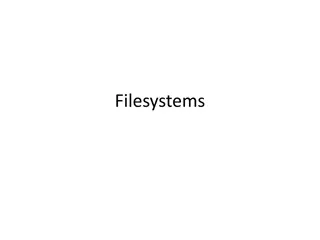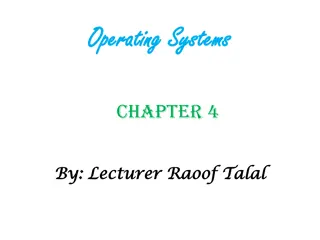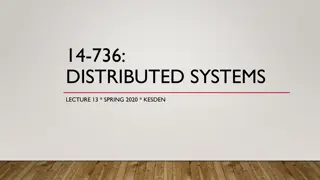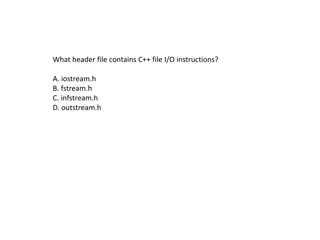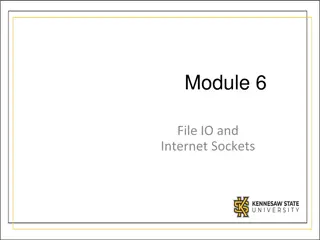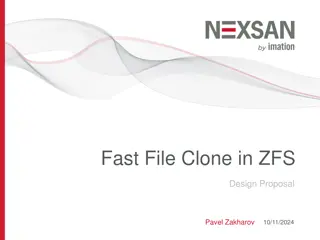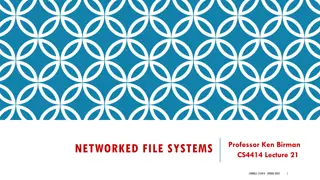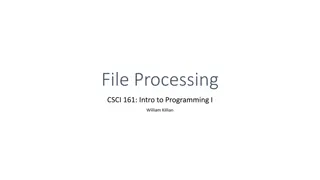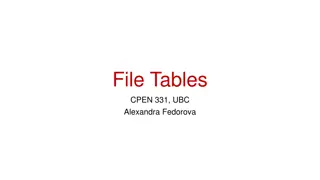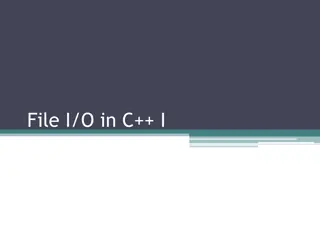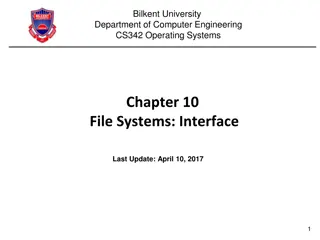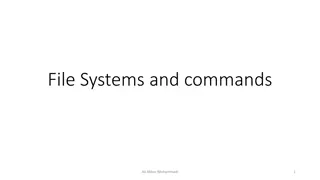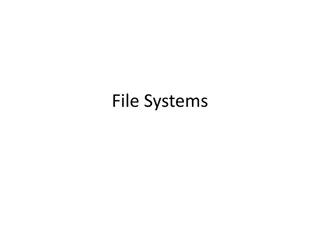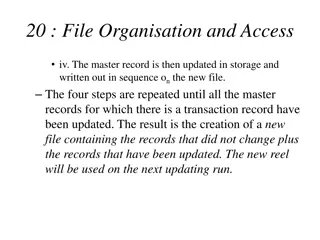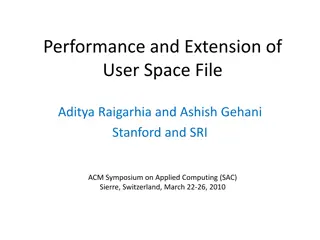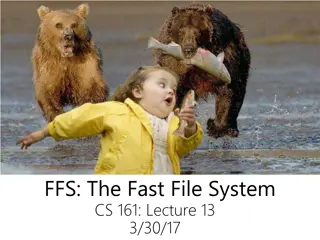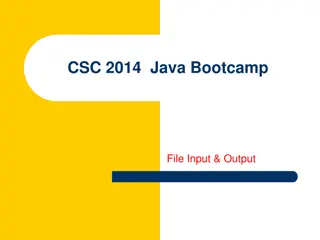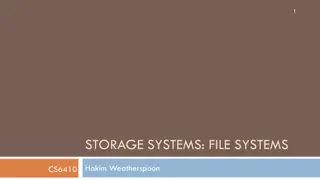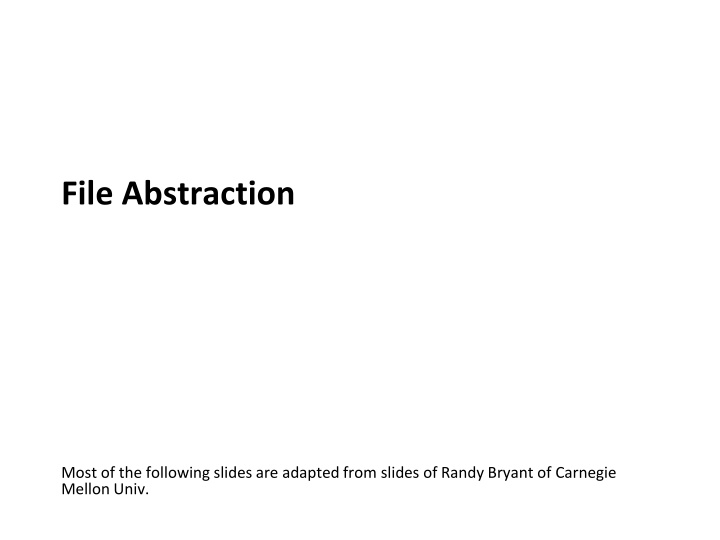
File Abstraction and I/O in UNIX Systems
Delve into the world of file abstraction and input/output operations in UNIX systems. Explore how files are used for I/O, the differences between C Standard I/O and Unix I/O, and the elegant mapping of files to devices. Learn about opening files and the special files stdin, stdout, and stderr in UNIX, providing a comprehensive overview of file handling in a Unix environment.
Download Presentation

Please find below an Image/Link to download the presentation.
The content on the website is provided AS IS for your information and personal use only. It may not be sold, licensed, or shared on other websites without obtaining consent from the author. If you encounter any issues during the download, it is possible that the publisher has removed the file from their server.
You are allowed to download the files provided on this website for personal or commercial use, subject to the condition that they are used lawfully. All files are the property of their respective owners.
The content on the website is provided AS IS for your information and personal use only. It may not be sold, licensed, or shared on other websites without obtaining consent from the author.
E N D
Presentation Transcript
Carnegie Mellon File Abstraction Most of the following slides are adapted from slides of Randy Bryant of Carnegie Mellon Univ.
Carnegie Mellon UNIX File Abstraction In UNIX, the file is the basic abstraction used for I/O Used to access disks, CDs, DVDs, USB and serial devices, network sockets, even memory!
Carnegie Mellon Unix I/O and C Standard I/O C Standard Most useful for reading/writing files in applications Provides buffering between program and actual files Unix I/O Lower level Required for system and network programming fopen fdopen fread fwrite fscanf fprintf sscanf sprintf fgets fputs fflush fseek fclose C application program Standard I/O functions open read write lseek stat close Unix I/O functions (accessed via system calls)
Carnegie Mellon Unix I/O Overview A Linux file is a sequence of m bytes: B0 , B1 , .... , Bk , .... , Bm-1 Cool fact: All I/O devices are represented as files: /dev/sda2(/usrdisk partition) /dev/tty2(terminal) Even the kernel is represented as a file: /boot/vmlinuz-3.13.0-55-generic (kernel image) /proc (kernel data structures)
Carnegie Mellon Unix I/O Overview Elegant mapping of files to devices allows kernel to export simple interface called Unix I/O: Opening and closing files open()and close() Reading and writing a file read()and write() Changing the current file position(seek) indicates next offset into file to read or write lseek() Bk-1BkBk+1 B0 B1 Current file position = k
Carnegie Mellon Opening Files Opening a file informs the kernel that you are getting ready to access that file int fd; /* file descriptor */ if ((fd = open("/etc/hosts", O_RDONLY)) < 0) { perror("open"); exit(1); } Returns a small identifying integer file descriptor fd == -1indicates that an error occurred
Carnegie Mellon stdin, stdout, stderr In UNIX, every process has three special files already open: standard input (stdin) filehandle 0 standard output (stdout) filehandle 1 standard error (stderr) filehandle 2 By default, stdin and stdout are connected to the terminal device of the process. Originally, terminals were physically connected to the computer by a serial line These days, we use virtual terminals using ssh VT100 terminal
Carnegie Mellon How the Unix Kernel Represents Open Files Two descriptors referencing two distinct open disk files. Descriptor 1 (stdout) and 2 (stderr) points to terminal, and descriptor 4 points to file opened on the disk. KERNEL SPACE Descriptor table [one table per process] Open file table [shared by all processes] v-node table [shared by all processes] File A (terminal) stdin File access fd 0 fd 1 fd 2 fd 3 fd 4 stdout Info in stat struct File size File pos refcnt=1 ... stderr File type ... File B (disk) File access File size File pos refcnt=1 ... File type ... File pos is maintained per open file
Carnegie Mellon File Sharing Two distinct descriptors sharing the same disk file through two distinct open file table entries E.g., Calling opentwice with the same filenameargument KERNEL SPACE Descriptor table [one table per process] Open file table [shared by all processes] v-node table [shared by all processes] File A (terminal) stdin File access fd 0 fd 1 fd 2 fd 3 fd 4 stdout File size File pos refcnt=1 ... stderr File type ... File B (disk) File pos refcnt=1 ... Different logical but same physical file
Carnegie Mellon How Processes Share Files: fork() A child process inherits its parent s open files Note: situation unchanged by exec() functions Before fork() call: KERNEL SPACE Descriptor table [one table per process] Open file table [shared by all processes] v-node table [shared by all processes] Parent File A (terminal) stdin File access fd 0 fd 1 fd 2 fd 3 fd 4 stdout File size File pos refcnt=1 ... stderr File type ... File B (disk) File access File size File pos refcnt=1 ... File type ...
Carnegie Mellon How Processes Share Files: fork() A child process inherits its parent s open files After fork(): Child s table same as parents, and +1 to each refcnt KERNEL SPACE Descriptor table [one table per process] Open file table [shared by all processes] v-node table [shared by all processes] Parent File A (terminal) stdin File access fd 0 fd 1 fd 2 fd 3 fd 4 stdout File size File pos refcnt=2 ... stderr File type ... File B (disk) Child File access stdin fd 0 fd 1 fd 2 fd 3 fd 4 File size stdout File pos refcnt=2 ... stderr File type ... File is shared between processes
Carnegie Mellon Shell redirection The shell allows stdin, stdout, and stderr to be redirected (say, to or from a file). > ./myprogram > somefile.txt Connects stdout of myprogram to somefile.txt > ./myprogram < input.txt > somefile.txt Connects stdin to input.txt and stdout to somefile.txt > ./myprogram 2> errors.txt Connects stderr to errors.txt In this case, the shell simply opens the file, making sure the file handle is 0, 1, or 2, as appropriate. Problem: open() decides what the file handle number is. How do we coerce the filehandle to be 0, 1, or 2?
Carnegie Mellon Initially stdout prints to the display of the terminal as default. KERNEL SPACE Descriptor table For myprogram Open file table [shared by all processes] v-node table [shared by all processes] Display stdin File access fd 0 fd 1 fd 2 fd 3 fd 4 stdout Info in stat struct File size File pos Refcnt=1 ... stderr File type ...
Carnegie Mellon All we need to do is to point stdout to a file Question: But the Descriptor table is kernel space, and we cannot modify it directly. Need to use system calls! KERNEL SPACE Descriptor table For myprogram Open file table [shared by all processes] v-node table [shared by all processes] Display stdin File access fd 0 fd 1 fd 2 fd 3 fd 4 stdout Info in stat struct File size File pos refcnt=1 ... stderr File type ... foo.txt (disk) File access File size File pos refcnt=1 ... File type ...
Carnegie Mellon dup() : before #include <unistd.h> int dup(int filedes); //dup() returns lowest available file descriptor, now referring to whatever filedes refers to newfd = dup(1); // newfd will be 3. KERNEL SPACE Descriptor table For myprogram Open file table [shared by all processes] v-node table [shared by all processes] Display stdin File access fd 0 fd 1 fd 2 fd 3 fd 4 stdout Info in stat struct File size File pos refcnt=1 ... stderr File type ...
Carnegie Mellon dup() : after #include <unistd.h> int dup(int filedes); //dup() returns lowest available file descriptor, now referring to whatever filedes refers to newfd = dup(1); // newfd will be 3. KERNEL SPACE Descriptor table For myprogram Open file table [shared by all processes] v-node table [shared by all processes] Display stdin File access fd 0 fd 1 fd 2 fd 3 fd 4 stdout Info in stat struct File size File pos refcnt=2 ... stderr File type ...
Carnegie Mellon dup2() : before #include <unistd.h> int dup2(int oldfd, int newfd); //Copies descriptor table entry oldfd to entry newfd int foofd = open( foo.txt", O_WRONLY); //foofd becomes 3. if (dup2(foofd, stdout)>0) printf( printing to foo.txt\n ); KERNEL SPACE Descriptor table For myprogram Open file table [shared by all processes] v-node table [shared by all processes] Display stdin File access fd 0 fd 1 fd 2 fd 3 fd 4 stdout Info in stat struct File size File pos refcnt=1 ... stderr File type ... foo.txt (disk) File access File size File pos refcnt=1 ... File type ...
Carnegie Mellon dup2() : after #include <unistd.h> int dup2(int oldfd, int newfd); //Copies descriptor table entry oldfd to entry newfd int foofd = open( foo.txt", O_WRONLY); //foofd becomes 3. if (dup2(foofd, stdout)>0) printf( printing to foo.txt\n ); KERNEL SPACE Descriptor table For myprogram Open file table [shared by all processes] v-node table [shared by all processes] Display stdin File access fd 0 fd 1 fd 2 fd 3 fd 4 stdout Info in stat struct File size File pos refcnt=1 ... stderr File type ... foo.txt (disk) File access File size File pos refcnt=2 ... File type ...
Carnegie Mellon dup() and dup2()pseudocode dup(fd) returns lowest available file descriptor, now referring to whatever oldfd refers to refers to. dup2(oldfd,newfd) copies descriptor table entry oldfd to entry newfd. //Descriptor table void *DT[maxFd]; //Descriptor table void *DT[maxFd]; int dup(int oldfd){ //get the lowest available //file descriptor newfd = lowestFd(DT); DT(newfd)=DT(oldfd); return(newfd); } int dup2(int oldfd, int newfd){ DP[newfd]=DP[oldfd]; return(newfd); } If oldfd is not a valid file descriptor, then the call fails, and newfd is not closed. If oldfd is a valid file descriptor, and newfd has the same value as oldfd, then dup2() does nothing, and returns newfd.
Carnegie Mellon I/O and Redirection Example #include "csapp.h" int main(int argc, char *argv[]) { int fd1, fd2, fd3; char c1, c2, c3; char *fname = argv[1]; fd1 = open(fname, O_RDONLY, 0); fd2 = open(fname, O_RDONLY, 0); fd3 = open(fname, O_RDONLY, 0); dup2(fd2, fd3); read(fd1, &c1, 1); read(fd2, &c2, 1); read(fd3, &c3, 1); printf("c1 = %c, c2 = %c, c3 = %c\n", c1, c2, c3); return 0; } ffiles1.c What would this program print for file containing abcde ?
Carnegie Mellon I/O and Redirection Example #include "csapp.h" int main(int argc, char *argv[]) { int fd1, fd2, fd3; char c1, c2, c3; char *fname = argv[1]; fd1 = Open(fname, O_RDONLY, 0); fd2 = Open(fname, O_RDONLY, 0); fd3 = Open(fname, O_RDONLY, 0); Dup2(fd2, fd3); Read(fd1, &c1, 1); Read(fd2, &c2, 1); Read(fd3, &c3, 1); printf("c1 = %c, c2 = %c, c3 = %c\n", c1, c2, c3); return 0; } c1 = a, c2 = a, c3 = b dup2(oldfd, newfd) ffiles1.c What would this program print for file containing abcde ?
Carnegie Mellon Master Class: Process Control and I/O #include "csapp.h" int main(int argc, char *argv[]) { int fd1; int s = getpid() & 0x1; char c1, c2; char *fname = argv[1]; fd1 = Open(fname, O_RDONLY, 0); Read(fd1, &c1, 1); if (fork()) { /* Parent */ sleep(s); Read(fd1, &c2, 1); printf("Parent: c1 = %c, c2 = %c\n", c1, c2); } else { /* Child */ sleep(1-s); Read(fd1, &c2, 1); printf("Child: c1 = %c, c2 = %c\n", c1, c2); } return 0; } ffiles2.c What would this program print for file containing abcde ?
Carnegie Mellon Master Class: Process Control and I/O #include "csapp.h" int main(int argc, char *argv[]) { int fd1; int s = getpid() & 0x1; char c1, c2; char *fname = argv[1]; fd1 = Open(fname, O_RDONLY, 0); Read(fd1, &c1, 1); if (fork()) { /* Parent */ sleep(s); Read(fd1, &c2, 1); printf("Parent: c1 = %c, c2 = %c\n", c1, c2); } else { /* Child */ sleep(1-s); Read(fd1, &c2, 1); printf("Child: c1 = %c, c2 = %c\n", c1, c2); } return 0; } Child: c1 = a, c2 = b Parent: c1 = a, c2 = c Parent: c1 = a, c2 = b Child: c1 = a, c2 = c Bonus: Which way does it go? ffiles2.c What would this program print for file containing abcde ?
Carnegie Mellon For Further Information The Unix bible: W. Richard Stevens & Stephen A. Rago, Advanced Programming in the Unix Environment, 2nd Edition, Addison Wesley, 2005 Updated from Stevens 1993 book Stevens is arguably the best technical writer ever. Produced authoritative works in: Unix programming TCP/IP (the protocol that makes the Internet work) Unix network programming Unix IPC programming https://github.com/shihyu/Linux_Programming/tree/master/books
Carnegie Mellon Bonus material The following slides are provided as extra and is not part of the course coverage. Enjoy!
Carnegie Mellon System Call Error Handling On error, Linux system-level functions typically return -1 and set global variable errno to indicate cause. Hard and fast rule: You must check the return status of every system-level function Only exception is the handful of functions that return void Example: if ((pid = fork()) < 0) { fprintf(stderr, "fork error: %s\n", strerror(errno)); exit(-1); }
Carnegie Mellon Error-reporting functions Can simplify somewhat using an error-reporting function: void unix_error(char *msg) /* Unix-style error */ { fprintf(stderr, "%s: %s\n", msg, strerror(errno)); exit(-1); } Note: csapp.c exits with 0. if ((pid = fork()) < 0) unix_error("fork error");
Carnegie Mellon Error-handling Wrappers We simplify the code we present to you even further by using Stevens-style error-handling wrappers: pid_t Fork(void) { pid_t pid; if ((pid = fork()) < 0) unix_error("Fork error"); return pid; } pid = Fork(); NOT what you generally want to do in a real application
Carnegie Mellon Standard I/O Streams Standard I/O models open files as streams Abstraction for a file descriptor and a buffer in memory. Similar to buffered RIO (later) C programs begin life with three open streams (defined in stdio.h) stdin (standard input) stdout (standard output) stderr (standard error) #include <stdio.h> extern FILE *stdin; /* standard input (descriptor 0) */ extern FILE *stdout; /* standard output (descriptor 1) */ extern FILE *stderr; /* standard error (descriptor 2) */ int main() { fprintf(stdout, "Hello, world\n"); }
Carnegie Mellon Buffering in Standard I/O Standard I/O functions use buffered I/O printf("h"); printf("e"); printf("l"); printf("l"); printf("o"); printf("\n"); buf h e l l o \n . . fflush(stdout); write(1, buf, 6); Buffer flushed to output fd on \n or fflush() call
Carnegie Mellon Standard I/O Buffering in Action You can see this buffering in action for yourself, using the always fascinating Unix strace program: #include <stdio.h> linux> strace ./hello execve("./hello", ["hello"], [/* ... */]). ... write(1, "hello\n", 6...) = 6 ... _exit(0) = ? int main() { printf("h"); printf("e"); printf("l"); printf("l"); printf("o"); printf("\n"); fflush(stdout); exit(0); } strace: a debugging tool in Linux. When you start a program using strace, it prints a list of system calls made by the program.
Carnegie Mellon Fork Example #2 (Earlier Lecture) Key Points Both parent and child can continue forking void fork2() { printf("L0\n"); fork(); printf("L1\n"); fork(); printf("Bye\n"); } Bye L1 Bye Bye L0 L1 Bye
Carnegie Mellon Fork Example #2 (modified) Removed the \n from the first printf As a result, L0 gets printed twice void fork2a() { printf("L0"); fork(); printf("L1\n"); fork(); printf("Bye\n"); } Bye L0L1 Bye Bye L0L1 Bye
Carnegie Mellon Repeated Slide: Reading Files Reading a file copies bytes from the current file position to memory, and then updates file position char buf[512]; int fd; /* file descriptor */ int nbytes; /* number of bytes read */ /* Open file fd ... */ /* Then read up to 512 bytes from file fd */ if ((nbytes = read(fd, buf, sizeof(buf))) < 0) { perror("read"); exit(1); } Returns number of bytes read from file fd into buf Return type ssize_t is signed integer nbytes < 0indicates that an error occurred short counts(nbytes < sizeof(buf)) are possible and are not errors!
Carnegie Mellon Dealing with Short Counts Short counts can occur in these situations: Encountering (end-of-file) EOF on reads Reading text lines from a terminal Reading and writing network sockets or Unix pipes Short counts never occur in these situations: Reading from disk files (except for EOF) Writing to disk files



